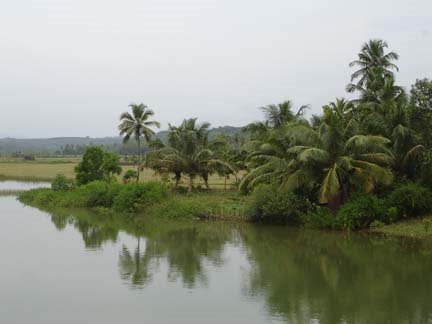Recently, a catalogue of a big online
selling company, attracted my attention to an item ‘Tote bags’ (Ladies
hand-bags) while checking my Inbox. It
surprised me and enkindled my memory of ‘Totte’ in Tulu and Kannada languages. It provoked me to explore these words and their
origin. Here it goes!
Tote
In English (both British &
American), ‘tote’ (pronounced as ‘toht
or taut’) means :(1) to carry as on
one’s back or in one’s arms (e.g.: to tote a bundle), (2) to carry on one’s
person (e.g: to tote a gun) and (3) to transport or convey as on a vehicle or
boat. As a Noun, it also means: ‘an act
of toting and something toted. So, ’tote’ denotes carrying, bearing and
carting.
‘Tote’ is also a shortened form
of ‘a totalizator’. It is recorded since 1890-95
(Source: Dictinary.com, based on
‘Random House Dictionary’).
Word Origin
Online Etymology Dictionary (© 210
Douglas Harper) gives the original history for ‘tote’ as below:
“ …. ‘to carry’, 1670s, of unknown origin, originally
attested in Virginia, but OED discounts the popular theory of its origin in a
W. African language (cf. Kikongo tota
‘pick up’, Kimbundu tuta ‘carry, load’, related to Swahili ‘tuta’ pile up, carry’). Related: Toted – toting. Tote bag is first recorded in 1900.”
Totte
The word ‘toTTe’ ( t pronounced as ‘third’ and T as in English word 'tata ' and 'e' as in 'eddy')
is vogue in both Tulu and Kannada. We find its variations in other Dravidian
languages and also African languages, as explained in starting paras. Originally, it is a basket or bag made of
coconut leaves, mundevu (Pandanus utilis)
and other broad ribbon- like leaves of some trees and shrubs.
I
reflectively remember the days holding a ‘totte’
of coconut leaves, when I followed my father or eldest brother to Kandevu, holding a
‘totte’, during community fishing in the tributary of River Nandini (Pavanje
River) – in May months (Read our Post-292: Fishing Ritual at
Kandevu).
Let us study the word and its
variants in Tulu & Kannada and other Dravidian languages.
Tulu
& Kannada:
Basket made of coconut leaves
or bag of paper. On evolution, it is made of plastic as small containers for
liquids, such as milk, curd, butter-milk, country liquor (ಸಾರಾಯಿ Saraayi)
or any small solid things.
‘Nesara
Totte’ (ನೇಸರ ತೊಟ್ಟೆ) means a ‘Solar
cell’.
Tulu ‘totte’ = tatti, i.e.
beehive, honeycomb or bee’s empty cell, Kannada: Jenu totte (= beehive),
Tottu = Nipple of a
breast (both in Tulu and Kannada) or joint of flowers and fruits in tree
branches.
Tulu ‘totte’ also means: ‘empty’. It is
empty before filling.
‘ನಿನನು ನಂಬುನ್ಡ ಬಂಜಿಗ್ ತೊಟ್ಟೆನೆ’ (Ninanu nambunda banjig tottene). Meaning:
“If we believe in you, our stomach will be empty.” Derived meaning is: “We will
be losers.” It is a statement of lack of faith or confidence on the ability of a
companion.
Kannada
‘Totti” = Water tank.
Tamil: Totaiyal = honeycomb.
Telugu: Tettiya = honeycomb.
Kolambi: Tatta
(Refer ‘Tulu Lexicon’ and
‘Dravidian Etymological Dictionary, page 307, Entry: 3489 & 3490)’
Totte to
Tote?
The origin of ‘tote’ is
uncertain as we gather from the information given above. What is the origin then? We firmly believe
that it is a Dravidian word. We can trace it to the ancient maritime
(traditional) trade with South Indian coasts by the Arab World and European
countries. So, the word ‘totte’ has
travelled to West Asia and other Continental countries through trade route and
is shaped to ‘tote’ with the meanings in present-day English language.
Plastic Tottes
Totte-making from traditional
and unharmful items (say, leaves, rattan, cloth or paper) has evolved and now
almost all the carry-bags are made of plastics and aluminum foils. Though it looks innoxious or innocuous, it
has deleterious effects on environment and human health. We can add diapers also to ‘Totte’
category. Burning of plastic carry bags
and diapers emits obnoxious gases and irritating smell, thus polluting the air
and the earth and harming human health.
Measures are taken by almost all countries to get rid of the menace of
plastic ‘tottes’ or carry bags but they are not effective.
Conclusion
We lay emphasis on influence of
Dravidian languages, especially Tulu and Kannada, on the origin of word ‘Tote’
in English. Linguists may make a note of
it.
Garbage of plastic bags are
spread on roads, rivers, trees, mountains and pilgrimage places. Let us resolve not to use plastic carry bags
indiscriminately.
- Hosabettu Vishwanath, Pune





